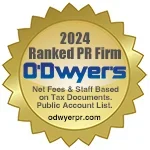 |
| Andy Tannen |
While digitization may have changed almost everything in the PR industry since the popularization of the World Wide Web in the 1990s, there's one exception: the op-ed.
The op-ed column, which first appeared on its own page under that name in the New York Times on September 21, 1970, has, if anything, become more important than ever—largely by staying the same (even if the Times replaced the term op-ed with "guest essay" last year in its online Opinion section).
Digitization has brought such changes as allowing many op-eds to display posted comments in real-time. It also enables 600 million blogs to express opinions on the web and in millions of daily LinkedIn posts. Yet the prestige of thought leadership that comes with writing an op-ed for a major news outlet has not been diminished by the digital world.
How many times does an influential electronic media outlet base an interview on a just-published op-ed? I have heard reporters on CNBC's Squawk Box and multiple reporters on Bloomberg Radio and TV promote an upcoming executive interview because a guest penned an op-ed in a major daily that morning. The op-ed is, at times, the news hook.
Former president Trump turned an op-ed into front-page news when, in 2018, someone reportedly in his administration anonymously published a critical column in the New York Times that called Mr. Trump "impetuous, adversarial, petty and ineffective." The President angrily demanded to know who wrote it but could not find out until 2020, when his Homeland Security chief of staff, Miles Taylor, took credit after resigning.
Also, in 2018, researchers at Yale University conducted a study which determined that op-ed columns result in long-lasting impact on people's views among both the general public and policy experts. That study, published in the Quarterly Journal of Political Science, found that op-eds swayed the opinions of both Republicans and Democrats in roughly equal percentages. According to Alexander Coppock, assistant professor of political science at Yale and the study's lead author, "We found that op-ed pieces have a lasting effect on people's views regardless of their political affiliation or their initial stance on an issue."
Since 1970, op-eds have always been important to clients working to build or sustain their corporate reputation. Nearly every new client I have talked to throughout my 44-year PR career has asked about developing an op-ed for their CEO aimed at the Wall Street Journal, New York Times, Washington Post or Financial Times. I always tell them the reality is that very few op-eds in those top-tier news outlets are from CEOs, but rather from elected representatives (even the president), government officials, professors, economists, money managers or think tank leaders. It also helps to have a well-reviewed new book just published. And many published op-eds are commissioned by the opinion editors, not pitched over the transom by a PR person.
It's hopeful to see that after all these decades, the op-ed is more than holding its own. It remains a major part of the foundation of the print/online news media and shows no signs of getting "old." Keep them in your media plan.
***
Andy Tannen is president of Tannen Corporate Communications, a corporate reputation consultancy. Previously, he worked in corporate communications at Publicis Groupe's MSL for 28 years, with clients such as IBM, United Technologies, Roche, Honeywell, BP and many other companies.


 The NBA, which promotes legalized gambling 24/7, seems more than hypocritical for banning player for placing bets... Diocese of Brooklyn promises to issue press release the next time one of its priests is charged with sexual abuse... Truth Social aspires to be one of Donald Trump's iconic American brands, just like Trump University or Trump Steaks or Trump Ice Cubes.
The NBA, which promotes legalized gambling 24/7, seems more than hypocritical for banning player for placing bets... Diocese of Brooklyn promises to issue press release the next time one of its priests is charged with sexual abuse... Truth Social aspires to be one of Donald Trump's iconic American brands, just like Trump University or Trump Steaks or Trump Ice Cubes. Publicis Groupe CEO Arthur Sadoun puts competition on notice... Macy's throws in the towel as it appoints two directors nominated by its unwanted suitor... The Profile in Wimpery Award goes to the Ford Presidential Foundation for stiffing American hero and former Wyoming Congresswoman Liz Cheney.
Publicis Groupe CEO Arthur Sadoun puts competition on notice... Macy's throws in the towel as it appoints two directors nominated by its unwanted suitor... The Profile in Wimpery Award goes to the Ford Presidential Foundation for stiffing American hero and former Wyoming Congresswoman Liz Cheney. JPMorgan Chase chief Jamie Dimon's "letter to shareholders" is a must-read for PR people and others interested in fixing America and living up to its potential... Get ready for the PPE shortage when the next pandemic hits... Nixing Netanyahu. Gaza carnage turns US opinion against Israel's prime minister.
JPMorgan Chase chief Jamie Dimon's "letter to shareholders" is a must-read for PR people and others interested in fixing America and living up to its potential... Get ready for the PPE shortage when the next pandemic hits... Nixing Netanyahu. Gaza carnage turns US opinion against Israel's prime minister. Trump Media & Technology Group sees Elon Musk's X as an option for those who want the free expression promised by Truth Social but without Donald Trump, owner of 57.3 percent of TMTG... Chalk one up for "anti-woke warrior" governor Greg Abbott as University of Texas lays off 60 DEI-related staffers... Five percent of Americans see the US as its own worst enemy, according to Gallup.
Trump Media & Technology Group sees Elon Musk's X as an option for those who want the free expression promised by Truth Social but without Donald Trump, owner of 57.3 percent of TMTG... Chalk one up for "anti-woke warrior" governor Greg Abbott as University of Texas lays off 60 DEI-related staffers... Five percent of Americans see the US as its own worst enemy, according to Gallup. Nine of the Top 100 firms that participated in O'Dwyer's rankings last year apparently threw in the towel for the 2024 scorecard. Seven other firms also went AWOL.
Nine of the Top 100 firms that participated in O'Dwyer's rankings last year apparently threw in the towel for the 2024 scorecard. Seven other firms also went AWOL.


 Have a comment? Send it to
Have a comment? Send it to 
No comments have been submitted for this story yet.